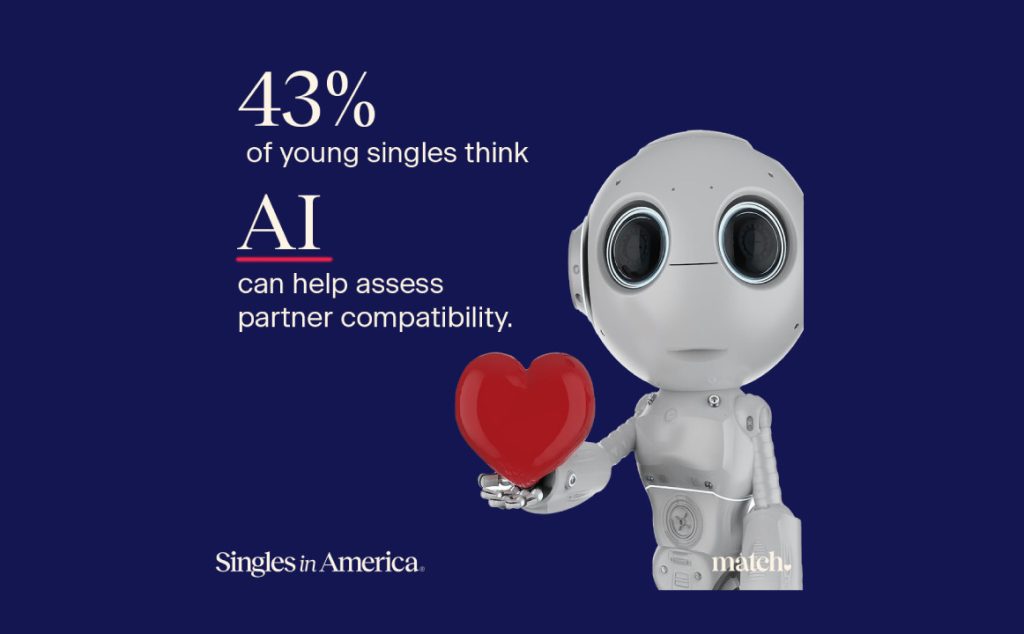Dating platform Match has released the results of its annual Singles in America study, exploring perspectives on AI, non-monogamy, sex education, and more. This year’s study was completed with the insights of 5,000 U.S. singles.
In its 13th edition, the Singles in America study is the country’s largest annual study of single adults. Over the years, Match has collected the insights and trends of over 70,000 singles, tracking the changing attitudes towards sex, love, and marriage.
Here are some of the insights from this year’s report:
AI and Dating
Only 6% of all daters have used artificial intelligence in their dating life. Among those who’ve tried the technology, 43% used it to help create their profile, while 37% used it to create an opening message.
For those brave enough to try AI, 27% and 26% reported that the technology got them a higher quality and a higher number of matches, respectively.
Looking ahead, many daters are optimistic about the role that AI can play in their love life. 43% of young daters think that AI could potentially act as a matchmaker. However other roles it could play include sorting matches (34%); helping create a profile (29%); and helping come up with conversation topics (30%).
Taking into account these insights, “AI is positioned to become a vital new tool for finding love”, says Dr. Helen Fisher, Match’s Chief Scientific Advisor.
Openness to Non-Monogamy
49% of singles told Match that traditional monogamy is their ideal sexual relationship. However, 31% said that they have tried consensual non-monogamy in the past, with half of that group prepared to try it again in the future.
Respondents identified that non–monogamy can come in different shapes and forms, including ‘monogamish’, polyamory, open relationships, and swinging.
Among those who’ve tried consensual non-monogamy, these daters highlighted the positive effects that can come from these types of relationships, such as better understanding of what they want from a relationship, more sexual openness, more emotional maturity, and more frequent sex.
However, this will not appeal to all daters, especially the 21% who stated that they are not pursuing a sexual relationship currently.
The Importance of Sex Education
Respondents in the Singles in America study recognised that with more sex education at a younger age, they would be able to enjoy happier and healthier relationships today.
With more sex education, singles shared that they would have more sexual confidence now (40%), would know how to talk about sex with partners (32%), and would now how to date more effectively (30%).
While many respondents shared that their sex education had touched on areas such as pregnancy, abstinence, and puberty, they also highlighted the areas they didn’t learn about. These include:
- How to talk about what you want (39%)
- Gender identity (38%)
- How to talk about sex in general (35%)
- How to give and ask for consent (31%)
- How to establish and/or discuss sexual orientation (26%)
With this being the case, respondents shared that they learnt about healthy relationships, sexual orientation, and consent through their peers / friends most of the time.
Issues Affecting Gen Z
90% of Gen Z respondents shared that they “feel significant stress” currently, with major issues such as finances, physical health, and mental health, all playing a role.
Interesting insights from the young generation include:
- 58% report they feel lonely on a typical day
- 57% want to get married
- 64% want a partner who wants to marry
- 57% want a partner who wants children
Among the wider population, day-to-day finances remained the top stress-inducing issue. As a result of this, 64% of singles report having a monthly budget, and 73% financial stability is an important trait in a potential partner.
Click here to find the full Singles in America report, which explores other issues such as voting, therapy speak, and more.



